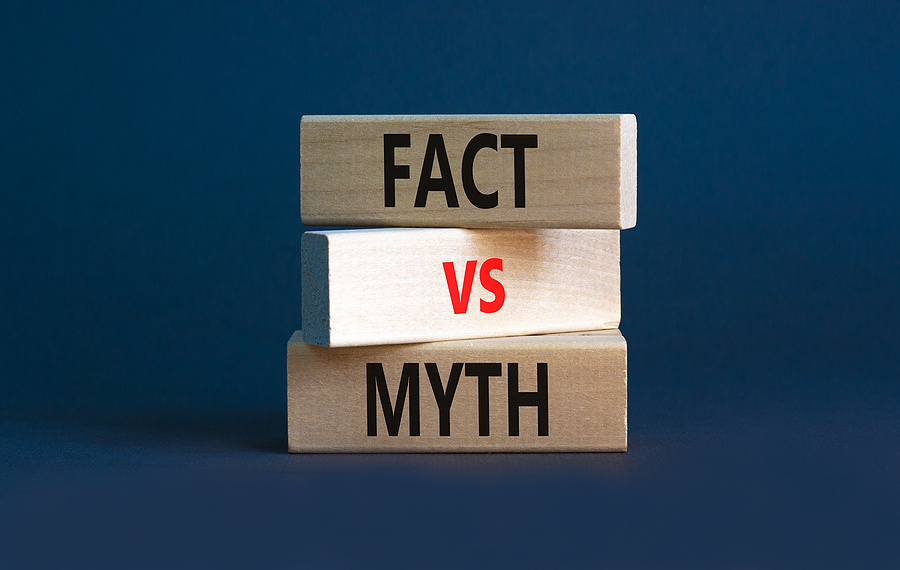One of the biggest reasons consumers hold off on filing for bankruptcy has to do with the myths surrounding the process. Misconceptions are often the reason behind these myths. Debunking these bankruptcy myths can shed light on the legal process that can help (and has helped) so many people, including an estimated 885,000 American consumers last year.
Myth 1: Bankruptcy Irreversibly Damages a Consumer’s Credit Score
While, yes, a bankruptcy case will almost certainly hurt a consumer’s credit score, this damage is far from permanent. In fact, many consumers have successfully rebuilt their credit scores after successfully completing a bankruptcy case.
The Truth: This is one of the biggest misconceptions and one that our clients can tell you is a complete myth.
My credit score said on all three reports 775, I couldn’t believe that I had such a great score before 10 years. Tim for me was the best move I have made for my situation. I have no regrets, I am glad the past is the past. – Bill T.
Hi Tim- I just wanted to send a quick note and thank you and your team for handling my bankruptcy case. It is only a month or two after discharge, and my credit scores are already in the upper 600’s. I’ve sent a screenshot in the event that you would like to use this to show prospective clients. – C.S.
You can begin to build your credit back with smart credit management. Within a few years, you can obtain a “good” credit score ranging from 700 – 749 by doing the following:
- Adding new credit, such as secured credit cards or small installment loans, to offset the negative information on your credit report;
- Making on-time payments for all debt, new and old;
- Keeping your credit card balances under 30% utilization.
Myth 2: Married Couples Must Both File for Bankruptcy.
Another common myth is that married couples must both file for bankruptcy. While sometimes, this fact is true, it is not true for all cases. If the debt involved is shared between both spouses, then both individuals need to be on the bankruptcy petition. If, however, one spouse has significantly more debt than the other, then the spouse carrying the larger portion of debt can do an individual bankruptcy petition to discharge the debt that is only in his or her name.
Myth 3: Bankruptcy Discharges All Consumer Debt
While bankruptcy discharges a large portion of consumer debt, it does not eliminate all financial obligations. Chapter 7 and Chapter 13 bankruptcy cases will end up discharging most unsecured debts, including credit card debt, medical bills, utility bills, and personal loans. Certain debts will stay with the consumer, regardless of the discharge, including child support, most tax debt, and spousal support. Student loan debt, while not impossible to discharge, can be quite difficult eliminate in a bankruptcy case, as well.
Myth 4: If the Consumer Adds a Large Amount of Debt Prior to Filing, that Debt Will Also Be Discharged.
At the end of the bankruptcy case, the consumer should walk away with a clean slate for most of his or her consumer debts. Some individuals unfortunately take advantage of that fact and will add a large amount of debt to their already existing debt load hoping that this money will also be discharged. Bankruptcy courts have traditionally considered this to be fraud whenever a consumer racks up expenses in anticipation of filing for bankruptcy. As a result, the consumer will end up on the hook for this debt one way or another.
Myth 5: Filing for Bankruptcy Will Result in the Consumer Losing Everything
Many consumers hold off on filing for bankruptcy due to the fear of losing everything they own in the process. The good news is most property is protected through one or more bankruptcy exemptions. Florida has some of the more generous bankruptcy exemptions out there, meaning that filers will have a significant amount of their assets protected throughout the bankruptcy process.
Myth 6: The Bankruptcy Process Is Too Complicated.
Another reason filers will hold off on moving forward with a bankruptcy case is the fear that the process is too hard or too complicated. Many consumers can file for bankruptcy and successfully complete the case without the assistance of an attorney. However, while it is highly possible to handle the entire process without the help of a bankruptcy attorney, it is recommended that the consumer have an attorney work through the initial paperwork with him or her. Having an attorney by the consumer’s side can eliminate some of the simple mistakes that can be made along the way, leading to the case being dismissed or thrown out.
Myth 7: Filing for Bankruptcy Means You Have Failed. Given that the number one reason for filing for bankruptcy is due to medical debt, this could not be less true. No surprise, the cost of medical deductibles has grown seven times faster than wages have risen. Many bankruptcies are likely the result of stagnant wages, not poor financial mismanagement. Whatever your reason is for filing, think of bankruptcy as a tool that can help you get a fresh start and take control of your finances.
Please click here to read more.
If you have questions on this topic or are in financial crisis and considering filing for bankruptcy, contact an experienced Miami bankruptcy attorney who can advise you of all of your options. As an experienced CPA as well as a proven bankruptcy lawyer, Timothy Kingcade knows how to help clients take full advantage of the bankruptcy laws to protect their assets and get successful results. Since 1996 Kingcade Garcia McMaken has been helping people from all walks of life build a better tomorrow. Our attorneys’ help thousands of people every year take advantage of their rights under bankruptcy protection to restart, rebuild and recover. The day you hire our firm, we will contact your creditors to stop the harassment. You can also find useful consumer information on the Kingcade Garcia McMaken website at www.miamibankruptcy.com.


